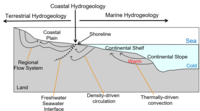Coastal hydrogeology

Coastal hydrogeology is all about water that is underneath the ground near the coast.
Picture a giant sponge under the beach. When water falls from the sky, some of it stays on the surface and some of it soaks into the ground. The water that soaks into the ground fills up the spaces in the sponge-like dirt and sand. This is called groundwater.
Coastal hydrogeologists study how that groundwater changes over time. They look at things like the way the tides and waves push water into and out of the sand, and how rivers and streams that flow into the ocean affect the water in the sand.
They also think about how people use the water that's underneath the sand. For example, people who live near the coast might drill wells to bring up groundwater to use for drinking and cooking.
But sometimes people take too much water out of the ground and the sponge gets empty. So, hydrogeologists work with communities and governments to make sure that there is enough water in the ground for everybody to use.
Picture a giant sponge under the beach. When water falls from the sky, some of it stays on the surface and some of it soaks into the ground. The water that soaks into the ground fills up the spaces in the sponge-like dirt and sand. This is called groundwater.
Coastal hydrogeologists study how that groundwater changes over time. They look at things like the way the tides and waves push water into and out of the sand, and how rivers and streams that flow into the ocean affect the water in the sand.
They also think about how people use the water that's underneath the sand. For example, people who live near the coast might drill wells to bring up groundwater to use for drinking and cooking.
But sometimes people take too much water out of the ground and the sponge gets empty. So, hydrogeologists work with communities and governments to make sure that there is enough water in the ground for everybody to use.
Related topics others have asked about:
